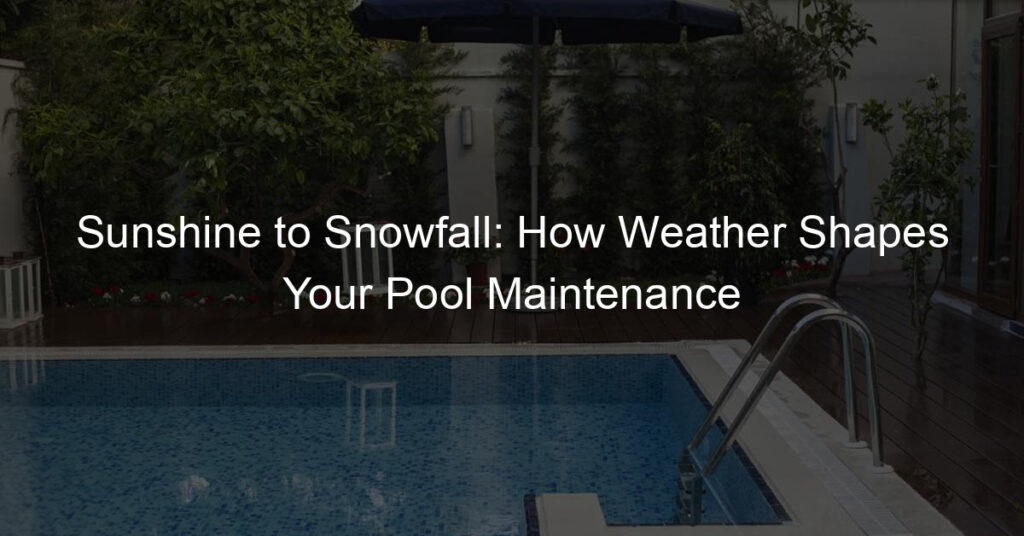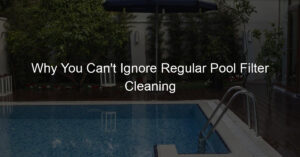Introduction: The Impact of Weather on Pool Maintenance
When it comes to maintaining a swimming pool, the weather plays a critical role. The changing seasons and varying weather conditions can significantly affect the pool’s water quality, chemical balance, and overall upkeep. This blog post aims to shed light on the relationship between weather and pool maintenance, and why seasonal pool maintenance is crucial.
- Understanding the relationship between weather and pool maintenance
- Importance of seasonal pool maintenance
The weather has a direct impact on your swimming pool. For instance, hot and sunny days can cause rapid evaporation, leading to water loss and an increase in the pool’s salt and chlorine concentration. On the other hand, heavy rainfall can dilute the pool’s chemicals, making them less effective. Cold weather, too, can cause problems like freezing pipes and damage to the pool’s structure. Therefore, understanding the weather’s impact can help you take appropriate measures to maintain your pool effectively.
Seasonal pool maintenance is an essential part of pool upkeep. Each season brings its own set of challenges. For example, in summer, you may need to add more chlorine to combat the heat and increased usage. In contrast, winter may require you to winterize your pool to prevent damage from freezing temperatures. Regular seasonal maintenance ensures that your pool remains clean, safe, and ready for use, regardless of the weather conditions.
In the following sections, we will delve deeper into the effects of weather on swimming pools, provide a detailed guide on seasonal pool maintenance, discuss the influence of weather on pool chemicals, and share some case studies on pool upkeep and weather conditions. By the end of this post, you will have a comprehensive understanding of weather-related pool maintenance and be equipped with key takeaways to keep your pool in top shape throughout the year.
Weather Effects on Swimming Pool: An Overview
Weather plays a significant role in the maintenance and overall health of your swimming pool. Understanding how different weather conditions can affect your pool is crucial for proper pool upkeep. This section will provide an overview of the impact of weather on your swimming pool and discuss some common weather-related pool issues.
- How weather conditions can affect your pool
- Common weather-related pool issues
- Algae growth: This is a common issue during hot and humid weather. Algae spores can multiply rapidly in warm water, leading to green, murky pool water.
- Cloudy water: This can occur after heavy rainfall, as the excess water can dilute the pool chemicals, making them less effective at keeping the water clear.
- Damage to pool equipment: Severe weather conditions, such as storms or freezing temperatures, can cause damage to pool equipment, including pumps, heaters, and filters.
Various weather conditions have different effects on your swimming pool. For instance, hot and sunny weather can cause water to evaporate quickly, leading to a decrease in water levels. On the other hand, heavy rainfall can lead to an increase in water levels and potentially dilute the chemicals in your pool, making them less effective.
Additionally, windy conditions can blow debris into your pool, which can clog filters and lead to poor water circulation. Cold weather, especially freezing temperatures, can cause damage to your pool’s plumbing system if it’s not properly winterized.
There are several common weather-related issues that pool owners often encounter. These include:
In conclusion, weather conditions can significantly impact your swimming pool, from water levels and chemical balance to the overall cleanliness and functionality of your pool. By understanding these effects, you can take proactive measures to mitigate these issues and keep your pool in top condition, regardless of the weather.
Seasonal Pool Maintenance: A Detailed Guide
Understanding how to maintain your pool throughout the different seasons is crucial for its longevity and your enjoyment. Let’s delve into the specifics of spring pool maintenance.
Spring Pool Maintenance
Spring is the perfect time to prepare your pool for the upcoming swimming season. It’s also an ideal time for a thorough cleaning. Here’s a detailed guide:
- Preparing your pool for the swimming season
- Pool cleaning tips for spring
After a long winter, your pool needs some attention to get it ready for the warm months ahead. Start by removing any pool cover and cleaning it thoroughly. Next, inspect your pool for any visible damage. If everything looks good, it’s time to refill your pool if necessary and start up the pump and filter system. Make sure to test the water and adjust the chemical levels as needed.
Spring cleaning is essential for a healthy and sparkling pool. Begin by skimming the surface of the pool to remove leaves and other debris. Don’t forget to clean the pool walls and floor using a pool brush. This helps to prevent algae buildup. Also, remember to clean out the skimmer baskets and the pool filter. Lastly, consider a shock treatment to kill bacteria and other microorganisms.
Spring pool maintenance might seem like a lot of work, but it’s worth it. A well-maintained pool is a joy to use and can provide endless fun for you and your family during the warm months. Remember, a little effort in spring can save you a lot of trouble during the summer.
Summer Pool Maintenance
When the summer sun is shining, it’s time to enjoy your swimming pool. But, the hot weather and increased pool usage can make maintenance a bit more challenging. Here are some tips to help you manage your pool during the summer months.
- Managing Pool Chemicals in Hot Weather
The hot summer weather can cause the water in your pool to evaporate quickly. This can lead to an imbalance in your pool’s chemical levels, which can cause problems like algae growth and cloudy water. Here’s how to manage your pool chemicals during the hot summer months:
- Check the chemical levels regularly: During the summer, it’s a good idea to check your pool’s chemical levels at least once a week. This will help you spot any imbalances early and take action before they become a problem.
- Adjust the chemicals as needed: If your pool’s chemical levels are off, you’ll need to adjust them. This might mean adding more chlorine to kill algae, or adding a pH balancer to keep the water clear.
- Keep the pool covered when not in use: Covering your pool when it’s not in use can help slow down evaporation, which can help keep your chemical levels stable.
- Dealing with Increased Pool Usage
Summer is the most popular time for swimming, which means your pool will likely see a lot more use. This increased usage can lead to more wear and tear on your pool, as well as a faster buildup of dirt and debris. Here’s how to deal with increased pool usage:
- Skim and vacuum regularly: With more people using the pool, there’s likely to be more debris. Make sure to skim your pool daily and vacuum it at least once a week to keep it clean.
- Monitor the water level: More use can lead to more water splashing out of the pool. Keep an eye on the water level and refill as needed.
- Check the pool equipment: More usage can put more strain on your pool’s equipment. Regularly check your pool’s pump, filter, and other equipment to make sure they’re working properly.
By following these tips, you can keep your pool clean and safe all summer long. Remember, a well-maintained pool is a happy pool!
Fall Pool Maintenance
As the leaves start to change color and the air gets chillier, it’s time to think about preparing your swimming pool for the colder months. Fall pool maintenance is crucial to ensure your pool’s longevity and to make sure it’s ready for the next swimming season. Let’s dive into the details.
- Preparing Your Pool for the Colder Months
When the swimming season is over, it’s essential to prepare your pool for the colder months. This process, also known as winterizing, helps protect your pool from potential damage due to freezing temperatures and keeps it clean for the next season.
Start by balancing the water chemistry. This includes the pH level, alkalinity, and calcium hardness. A well-balanced pool is less likely to develop algae and other problems. Next, clean your pool thoroughly. Remove any leaves, dirt, and debris. Don’t forget to clean the pool walls and floor too.
After cleaning, lower the water level. This prevents water from freezing and causing damage to the pool structure and plumbing system. Finally, cover your pool. A good pool cover protects your pool from debris and reduces the chances of algae growth.
- Pool Cleaning Tips for Fall
Keeping your pool clean during the fall can be a bit challenging due to the falling leaves and debris. Here are some tips to help you keep your pool clean and clear.
- Regular Skimming: Skim your pool daily to remove leaves and other debris. This not only keeps your pool clean but also prevents clogging of filters.
- Use a Pool Vacuum: A pool vacuum can help clean the pool floor and walls. It’s an effective way to remove dirt and small debris that the skimmer can’t catch.
- Check and Clean Filters: Filters play a crucial role in keeping your pool clean. Check them regularly and clean or replace them as needed.
- Use a Pool Cover: When the pool is not in use, cover it. This prevents leaves and debris from getting into the pool and makes your cleaning job easier.
Remember, a clean pool is not just about aesthetics. It also contributes to the health and safety of those who use it. So, make fall pool maintenance a priority and enjoy a clean, safe, and ready-to-use pool when the next swimming season arrives.
Winter Pool Maintenance
When winter comes, the pool maintenance routine changes significantly. The cold weather, snow, and freezing temperatures can cause damage to your pool if it’s not properly protected. In this section, we will discuss how to protect your pool during snowfall and provide a step-by-step guide to winterizing your pool.
- Protecting your pool during snowfall
Protecting your pool from snowfall is crucial to prevent damage to the pool’s structure and equipment. Here are some tips:
- Use a pool cover: A pool cover is the first line of defense against snow. It prevents snow from accumulating in the pool and causing water imbalance.
- Clear the snow regularly: Heavy snowfall can put pressure on the pool cover and cause it to collapse. Make sure to clear the snow off the cover regularly.
- Check the pool equipment: Ensure that the pool equipment is not exposed to the snow. Cover it or move it indoors if possible.
- Winterizing your pool: a step-by-step guide
Winterizing your pool is a process that prepares your pool for the winter months. Here’s a simple step-by-step guide:
- Balance the water chemistry: This helps protect the pool from staining and algae growth.
- Lower the water level: Lower the water level to below the skimmer line to prevent water from freezing in the pipes.
- Clean the pool: Remove any debris from the pool and clean it thoroughly.
- Add winterizing chemicals: These chemicals help keep the water clear and prevent algae growth during the winter months.
- Cover the pool: Finally, cover the pool to protect it from snow and other debris.
Remember, every pool is different, so the winterizing process might vary slightly. Always consult with a pool professional if you’re unsure about any step.
Winter pool maintenance can be a bit challenging, but with the right knowledge and tools, you can protect your pool and ensure it’s ready for the next swimming season.
Weather Influence on Pool Chemicals
Weather plays a significant role in maintaining the balance of your pool’s chemical composition. Let’s delve into how different weather conditions can affect pool chemistry and how to adjust pool chemicals accordingly.
- How weather conditions affect pool chemistry
- Adjusting pool chemicals for different weather conditions
- Hot and Sunny Weather: Increase the amount of chlorine to compensate for the faster evaporation rate.
- Heavy Rainfall: After a heavy downpour, test the pool’s chemical balance and add necessary chemicals to restore the balance.
- Windy Conditions: Regularly clean the pool to remove debris and dust. Also, monitor and adjust the pH level as needed.
- Cold Weather: Use a pool heater to maintain a consistent water temperature, ensuring that the chemicals dissolve and react properly.
Various weather conditions can have a profound impact on your pool’s chemical balance. For instance, hot and sunny weather can cause the chlorine in your pool to evaporate faster, leading to an imbalance. On the other hand, heavy rainfall can dilute the chemicals, making them less effective.
Moreover, windy conditions can bring in debris and dust, which can increase the pool’s pH level. In contrast, cold weather can decrease the water temperature, slowing down the rate at which chemicals dissolve and react in the pool.
Understanding how weather affects pool chemistry allows you to make necessary adjustments to maintain a healthy and safe swimming environment. Here are some tips:
In conclusion, understanding the influence of weather on pool chemicals is essential for maintaining a clean and safe pool. By adjusting the chemicals according to different weather conditions, you can ensure a pleasant swimming experience regardless of the weather.
Pool Upkeep and Weather Conditions: Case Studies
Understanding how weather conditions impact pool maintenance is crucial for every pool owner. Let’s delve into two case studies that highlight the challenges and solutions in managing a pool in different climates.
- Case study 1: Managing a pool in a tropical climate
- Case study 2: Pool maintenance in cold climates
In tropical climates, the hot and humid weather can pose unique challenges for pool maintenance. The high temperatures can lead to rapid evaporation of pool water, requiring frequent refilling. Additionally, the warm weather can promote the growth of algae and bacteria, necessitating regular cleaning and chemical treatment.
Consider the case of a pool owner in Miami, Florida. They faced persistent issues with algae growth due to the high humidity and temperature. To combat this, they implemented a routine of daily pool skimming and weekly vacuuming. They also monitored the pool’s chemical levels closely, adjusting as necessary to maintain a healthy balance. This proactive approach helped them maintain a clean and safe pool despite the challenging weather conditions.
In contrast, cold climates present a different set of challenges for pool maintenance. The freezing temperatures can cause damage to the pool structure and equipment if not properly winterized. Additionally, the lack of sunlight can affect the efficiency of chlorine, a common pool disinfectant.
Take the example of a pool owner in Anchorage, Alaska. They had to deal with freezing temperatures and snowfall, which could potentially damage their pool. To prevent this, they used a pool cover to protect the pool from snow and ice. They also regularly checked the pool equipment for any signs of freeze damage. Furthermore, they adjusted the chlorine levels to compensate for the reduced sunlight. These measures ensured that their pool remained in good condition throughout the cold season.
In conclusion, weather conditions significantly affect pool maintenance, and strategies must be adapted according to the climate. Whether it’s managing algae growth in a tropical climate or preventing freeze damage in a cold climate, proactive and regular maintenance is key to keeping your pool in top shape.
Conclusion: Key Takeaways for Weather-Related Pool Maintenance
In this comprehensive guide, we have explored the significant influence of weather on pool maintenance. We have seen how different weather conditions can impact the chemical balance, cleanliness, and overall upkeep of your swimming pool. Now, let’s summarize the key points we’ve learned.
- Importance of understanding the impact of weather on pool care
- Benefits of regular and seasonal pool maintenance
Understanding the impact of weather on pool care is crucial. Weather conditions such as temperature, rainfall, and wind can significantly affect your pool’s chemical balance and cleanliness. For instance, high temperatures can lead to rapid water evaporation and increase the concentration of chemicals in your pool. On the other hand, heavy rainfall can dilute your pool chemicals and introduce debris and contaminants. Therefore, being aware of these weather influences helps you take appropriate measures to maintain your pool’s health and safety.
Regular and seasonal pool maintenance offers numerous benefits. It helps keep your pool clean, safe, and ready for use, regardless of the weather conditions. Regular maintenance, such as checking and adjusting chemical levels, cleaning the pool, and inspecting pool equipment, ensures your pool remains in optimal condition. Seasonal maintenance, on the other hand, prepares your pool for the changing weather conditions and helps prevent potential issues that could arise due to these changes. In essence, regular and seasonal pool maintenance extends the lifespan of your pool and enhances your swimming experience.
In conclusion, weather-related pool maintenance is a vital aspect of pool ownership. It requires a good understanding of how weather impacts pool care and the benefits of regular and seasonal maintenance. By implementing the insights shared in this guide, you can ensure your pool remains clean, safe, and enjoyable, no matter the weather.














